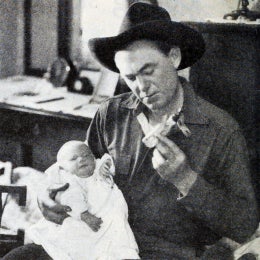
At the intersection of Hollywood’s Golden Age and the rugged spirit of the American West stands the Carey family, a long line of entertainers who profoundly shaped the film industry in the 20th century and significantly contributed to the history and evolution of the Western cinema genre. The family legacy will be preserved in perpetuity as the Carey Family Papers, which were recently donated to UCSB Library’s Film & Television Collection in the Department of Special Research Collections. A rich collection of home movies, film stills and scripts, correspondence, and ephemera, the Carey Family Papers represent the lives and acting careers of Harry Carey Sr., Olive Fuller Golden Carey, George Fuller Golden, Paul Fix, and Harry (Dobe) Carey Jr. The papers were donated by Patricia (Lily) Carey, Melinda Carey, and Tom Carey – the children of Harry Carey Jr. – who are the stewards of this unique Hollywood lineage.
Harry Carey Sr. (1878-1947), Lily and Melinda’s paternal great grandfather, was a pioneering cowboy star known for his hero roles in silent films and early sound Westerns, including director John Ford's first feature film, Straight Shooting (1917). One of his best-known performances is as the President of the U.S. Senate in the drama Mr. Smith Goes to Washington (1939), for which he was nominated for the Academy Award for Best Supporting Actor. His wife, Olive Fuller Golden Carey (1896-1988), was also an accomplished actress who appeared in more than 50 films. Together, the family became a staple of Western cinema, both on and off the screen.
Harry Carey Jr. (1921-2012) followed in his father's footsteps to become a respected actor in his own right, appearing in more than 90 films. He is best known for his collaborations with iconic directors like John Ford and his starring roles in many classic Westerns, including 3 Godfathers (1948), She Wore a Yellow Ribbon (1949), Cheyenne Autumn (1964) and The Searchers (1956), which the American Film Institute named “the greatest Western of all time.” With a career that spanned several decades, Carey Jr. became a beloved figure, recognized for his authentic portrayal of the cowboy spirit and the rugged individualism of the American West and his contributions to the genre’s evolution.
The collection also includes the archives of George Fuller Golden (1868-1912), Lily, Tom and Melinda’s great-grandfather, who was a popular vaudeville entertainer at the beginning of the 20th century in England. Golden is most renowned for his efforts to create an actor’s labor union named The White Rats in the United Kingdom and organized what is believed to be the first actor’s strike, which in turn influenced the creation of the American film, television and media labor union known today as SAG-AFTRA.
Finally, the collection also includes materials related to Paul Fix (1901-1983), Lily, Tom and Melinda’s maternal grandfather, who performed in almost 350 movies and television episodes. After befriending John Wayne in the 1930s, he became Wayne's acting coach and eventually appeared in nearly 30 of Wayne's films. He also starred as the presiding judge in the award-winning, classic film To Kill a Mockingbird (1962), opposite Gregory Peck.
“The Carey Family Papers are unlike any other family papers at UCSB. The collection encompasses the entire motion picture history from vaudeville and silent film to Western cinema and beyond through the lives and careers of a single family,” commented Film & Television Curator Laura Treat Liebhaber. “There has been a resurgence of interest from the scholarly community around the Western as one of the earliest cinematic genres. We are honored to be the long-term stewards of the Carey family legacy and are excited about the collection’s prospects for research.”
For the Carey family, the collection represents their impressive Hollywood lineage but also includes intimate moments on film and in photographs, which reveal a close family who loved to laugh and share stories. “My dad (Harry Carey, Jr), Paul (Fix), and Ollie (Olive Carey) were great raconteurs with amazing recall. They could remember who was on the set, what was said, and what happened and it was so entertaining. Our dad was also one of the funniest men I’ve ever known, Melinda remarked. “This collection is a treasure trove of our family’s history.”
Her sister Lily added: “The collection was meticulously organized by our mother, but it was becoming a burden due to its size. When the opportunity came to donate it to UCSB Library, we jumped at the chance. Preserving all of the photos and stories is a way to memorialize our family. It keeps their spirit alive.”
The Library recently completed the processing of the collection, which is now discoverable on the Online Archive of California.


